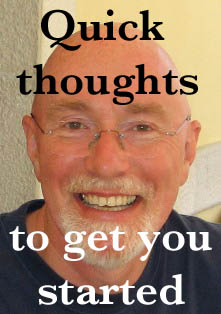 It seems to me that there is nothing more immediate and relevant than the question 'What is the good life, and how may it be achieved?'
It seems to me that there is nothing more immediate and relevant than the question 'What is the good life, and how may it be achieved?'
Whether or not we take a direct interest in national or local politics,we cannot avoid being caught up in the laws, traditions and values of the society in which we live, and the 'good life' (whatever we mean by that) cannot practically be achieved in isolation from other people.
Hence, even for those sceptical about the political process or the integrity of politicians, it is always going to be worthwhile to stop and reflect on the values we hold and the sort of society we want to live in.
 New to Political Philosophy? Here are some quick thoughts to get you started, or for you to use as the basis for a discussion...
New to Political Philosophy? Here are some quick thoughts to get you started, or for you to use as the basis for a discussion...
Can there be a good dictator? / Can you do well on your own? / Is a democratic decision always right? / Is gender irrelevant? / What price freedom? / Is a nation the right size? / Should you ever intervene on behalf of the people against its government?
Just click on my image to see these thoughts and get started.
Getting practical…
Some see philosophy’s main task as clarifying concepts. That would imply that the task of philosophy is to look at the key ideas in political debate – freedom, rights, justice, democracy, and so on – and to examine what people really mean by them, and how they are related to one another. That is the sort of philosophy that clears the mind but does not necessarily change the world.
But there is another tradition of political philosophy. Marx famously declared that he wanted to change the world, rather than just interpret it, and many other political thinkers have impacted on the course of history. Rousseau’s writings were to influence the French Revolution and Locke’s the American Declaration of Independence. Nietzsche’s work was read by Mussolini and Hitler (and sadly misused by them), and socialist ideas lay behind the setting up of the welfare state and health service in Britain. Today, neo-conservative views in the United States have influenced, among other things, American foreign policy with respect to the Middle East and the Iraq War. Discussions about terrorism and how to resist it are not just about words, but are desperately important in terms of security and human rights. So political concepts are not just there to be clarified, they need to be examined.
Political ideas are potent; but are they valid? The only way to establish that is by taking a two-stage look at them. First of all they need to be clarified: What exactly do we mean by fairness, or equality, or democracy? But secondly, they need to be justified: On what basis can you argue for the fairness of this or that political system? On what basis can you justify taking military action?
Like ethics, political philosophy is therefore concerned with the practical. It addresses issues of immediate concern to everyone, and examines ideas that have – for good or evil – shaped the lives of whole generations. When some crucial event takes place – a war, an economic crisis, a global threat, a spate of terrorist attacks – people will naturally ask fundamental questions about how we should deal with such things. Politicians are required to find answers and implement them, but they need to be guided by principles about how we should live and how society should be governed. So circumstances are always throwing up new issues for political philosophy.
(from the introduction to Understand Political Philosophy)
 Your basic introduction to the subject...
Your basic introduction to the subject...
256 pages, Teach Yourself (Hodder)
2nd edition, 2012, ISBN-13: 978-1444157598
The Contents of this book, are shown in the right-hand column - if you are on a phone, it will be below, or otherwise just turn your screen sideways to reveal the second column.
'An imbalance between rich and poor is the oldest and most fatal ailment of all republics.' - Plutarch
And it seems to me to be an imbalance too easily justified on economic grounds, or on the grounds that one needs to attract the best people for the job, whilst ignoring the long-term social and political damage it can bring about. Of course, brilliance and productivity should be rewarded, but what is happening today in terms of top salaries, when compared with average incomes, has become inappropriate and quite insane!
National identity in a cosmopolitan world?
Is it possible to be cosmopolitan, think globally, and yet also be patriotiic or at least have a sense of national or social identity? I am exploring some of the issues related to this in my latest blog post. Just click on my Union Jack cupcake to see my views...


